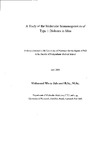A Study of the Molecular Immunogenetics of Type 1 Diabetes in Man
| dc.contributor.author | Jahromi, Mohamed Mirza | |
| dc.contributor.other | Faculty of Health | en_US |
| dc.date.accessioned | 2013-11-05T10:59:11Z | |
| dc.date.available | 2013-11-05T10:59:11Z | |
| dc.date.issued | 2000 | |
| dc.identifier | NOT AVAILABLE | en_US |
| dc.identifier.uri | http://hdl.handle.net/10026.1/2583 | |
| dc.description.abstract |
Type 1 diabetes is caused by immune destruction of pancreatic β cells. There is increasing evidence that genes outside the MHC region contribute to the pathogenesis of type 1 diabetes. Cytokines due to their role in immune regulation seem to play a crucial role in the pathogenesis of the disease. Three hundred and eight patients with type 1 diabetes and 150 normal controls were genotyped for polymorphism in the genes for IFN-γ, IL-4, IL-6, and TGF-β1. All assays employed in this study were PCR based. The IFN-γ CA repeats was an octa-allelic repeat and the 3 / 3 genotype showed a significant association with type 1 diabetes (p=0.0001). The IL-4 C (-590) T polymorphism did not show a significant association with type 1 diabetes. The GG genotype of G (-174) C of the IL-6 gene polymorphism showed a strong association with the susceptibility towards type 1 diabetes (p= 0.002). The TC genotype of the TGF-β1 T (+869) C polymorphism also showed a significant association with type 1 diabetes (p= 0.003). The association of the 3 I 3 genotype of the IFNG CA repeats and no association of IL-4 C (-590) T polymorphism may support the idea of dominance of the TH1 cytokine profile and type 1 diabetes suggesting a cell mediated disease. The IL-6 G (-174) C result attests an existing hypothesis of the important role of IL-6 in the onset of type 1 diabetes and its development. Immunosuppression of the TGF-β1 may have been initiated after deviation of the TH1/TH2 cytokine milieu. The GC of the IL-6 G (-174) C and the TC of the TGF-β1 T (+869) C showed strong association with diabetic nephropathy. Haplotype studies showed that cytokine function might be as a result of a cytokine network rather than individual cytokines. Further, the genetic susceptibility may be influenced not only by genetic composition but by the gender of patients as well as age at onset of type 1 diabetes. In conclusion these results suggest a contribution of the IFNG CA repeats, the TGF-β1 T (+869) C, and the IL-6 G (-174) C to the genetic susceptibility of type l diabetes and may have future therapeutical values. | en_US |
| dc.language.iso | en | en_US |
| dc.publisher | University of Plymouth | en_US |
| dc.title | A Study of the Molecular Immunogenetics of Type 1 Diabetes in Man | en_US |
| dc.type | Thesis | |
| plymouth.version | Full version: final and full version as approved by the examiners at the time of the award of your degree | en_US |
| dc.identifier.doi | http://dx.doi.org/10.24382/4630 |
Files in this item
This item appears in the following Collection(s)
-
01 Research Theses Main Collection
Research Theses Main


